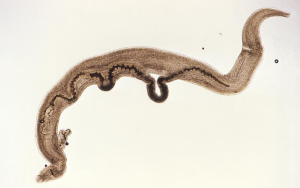Praziquantel campaign in Yemen shows good results against Schistosomiasis
The Yemen campaign against schistosomiasis, or bilharzia, has shown really good results over the past three years as infections of the chronic, parasitic disease have decreased by more than half, according to a World Health Organization news release Thursday.

Adult S. Mansoni
Image/CDC
In Yemen, both urogenital schistosomiasis due to Schistosoma haematobium and intestinal schistosomiasis due to Schistosoma mansoni are prevalent. More than 3 million people are estimated to be infected and at least three-quarters of a million suffer from severe, chronic morbidity.
Yemeni health authoritieshave distributed more than 18 million doses of praziquantel to treat the parasitic infection during the past 3 years, using over 45 million tablets.
The recommended WHO treatment for bilharzia is praziquantel at 40mg/kg of body weight, single-administration. The medicine is used at regular intervals depending on the prevalence of infection.
In the most affected districts, people received up to three doses of praziquantel once per year. In compliance with WHO recommendations, one tablet of albendazole or mebendazole was also coadministered to treat intestinal parasitic infections (soil-transmitted helminthiases), which are widely distributed in the country.
“We plan to accelerate our campaign against bilharzia to change the lives of millions of Yemenis suffering from this disease,” said Dr Majid Al-Jonaid, Yemen’s Deputy Minister for Primary Health Care. “Today we have the means and the will to end this long cycle of suffering caused by this preventable infection.”
According to the WHO, during March this year, more than 9 and a half million Yemenis, comprising adults and children, were treated for both bilharzia and intestinal soil-transmitted helminthiases in two separate 4-day campaigns, compared with a total of 1.9 million people treated during the whole of 2012.
The 6-year Yemen Schistosomiasis Control Project was launched in 2010 and is supported by a US$ 25 million grant from the World Bank; its completion is due in 2016.
An impact assessment was recently presented in Geneva and they found that infection levels collected from 2000 individuals have fallen by more than half since the beginning of the project, from 20% at baseline to 8%, with less than 4% harbouring severe infections. These accomplishments have been certified by an independent assessment conducted by an external auditing firm.
For more infectious disease news and information, visit and “like” the Infectious Disease News Facebook page















[…] we were able to diagnosed 327 schistosomiasis cases and immediately administered a single dose of Praziquantel tablet to reduce the severity of the […]